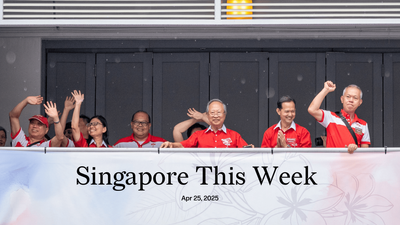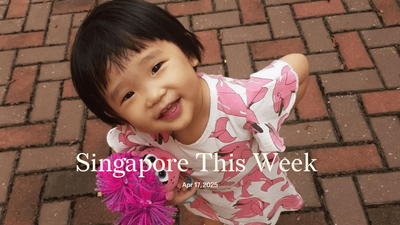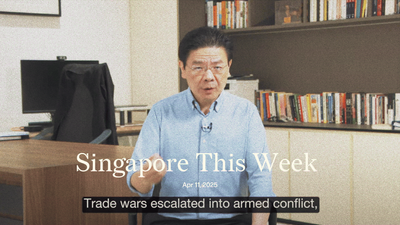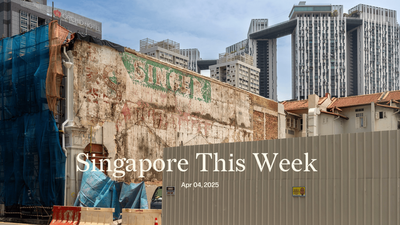Politics: The WP loses its POFMA virginity
The town council brouhaha that had ensnared the Workers’ Party (WP) for over a decade concluded in July, when the Aljunied-Hougang Town Council and the Sengkang Town Council dropped the lawsuits against WP leaders that they first brought seven years ago. (Prior to that, a number of court decisions had gone in the WP’s favour.) Following that, the WP’s Yee Jenn Jong, a former non-constituency member of Parliament in office (2011-15) when the saga first erupted, shared his observations on the case (here and here) “as a ringside observer”. This week, a whole month later, the government issued him correction directions under the Protection from Online Falsehoods and Manipulation Act (POFMA). As has become common with POFMA, the direction order was focused on possible false interpretations, rather than literal falsehoods: nowhere, for instance, did Yee actually say that the Ministry of National Development’s actions in the saga were “politically motivated”.
First, the Progress Singapore Party, then the Singapore Democratic Party, and finally, the Workers’ Party. The Singapore government has now issued POFMAs to politicians from every major opposition party. Not one from the ruling People’s Action Party has ever received one, despite what appeared, in Jom’s view, to be a blatant mischaracterisation of the WP’s housing proposals last year. The procedural problem is that the minister who first made the alleged misrepresentation in Parliament, Desmond Lee, is the same one who’d have to instruct the POFMA office to correct it once it had spread across the internet—a classic ownself-check-ownself problem inherent in POFMA’s design.
While the risk of online falsehoods globally is real, POFMA is flawed. At the very least, judges, not politicians, should be the arbiters. Worse, if the only politicians who receive them are from the opposition, there is a risk that more and more Singaporeans will start to dismiss it as a politicised tool. This threatens the perception of independence of our government institutions. Moreover, when faced with falsehoods, such as health or vaccine-related ones, which are far more damaging to society, will Singaporeans have full confidence in the POFMA office?
Some further reading: in “Did the PAP mischaracterise the WP’s housing proposals?”, Jom explores exactly what the WP wrote in its 2019 working paper, and how the PAP characterised it.
Society: Extra leave for mums and dads, but who’ll stand in at the office?
Couples welcomed two surprises from Lawrence Wong, prime minister, at his first National Day Rally Speech—mandating four weeks of paternity leave and 10 additional weeks of shared parental leave, for a new total of 30 weeks. But the news also delivered trepidation to some employers at small- and medium-sized enterprises (SMEs). They worry that performance will be affected because of added pressure on remaining staff and the resulting poor workload management. Companies with a small team and limited resources are likely to struggle, HR experts told CNA, especially when the employee on parental leave handles a critical job function. The four weeks’ notice is also too short, said Ang Yuit, president of the Association of SMEs, who warned that some enterprises may simply not have the time to find a replacement, choosing instead to “take the dip in productivity or…performance during that period, and just tide it over.” There’s also the added costs of recruitment, training, onboarding and offboarding. In countries like Sweden, Bulgaria and the UK with significantly longer leave allowances for parents (480 days, 425 days and 54 weeks, respectively) enterprises may find it easier to hire temporary replacement staff who prefer longer contracts (six months or more). But this comes with its own potential set of difficulties and frustrations for the employee when they return.
So, even as SME bosses express support for additional parental leave, it’s understandable that they’re also anxious about fulfilling these obligations. A nationwide push, involving the state, stakeholders and the media, is needed. Small business owners have asked for additional financial support from the government. Ordinary people (aka workers) can offer suggestions and counsel to employers unsure of how best to manage their leave policies. While the media shouldn’t frame the challenges in an adversarial way, pitting SMEs against workers, as seemingly two incongruous entities. Instead, it can spotlight best practices that have aligned corporate and employee interests; and encourage dialogue between both parties.
SMEs constitute 99 percent of all enterprises in Singapore, and employ over 70 percent of its workforce. A well-conceived strategy to incorporate maternity and paternity leave is not only the right thing to do for staff, but one that can boost talent recruitment and retention. The challenge is achieving this without serious repercussions for the bottomline and the welfare of employees who have to take on additional responsibilities in a colleague’s absence. It’s a tricky, but crucial, balance to strike. Building inclusive and equitable workplaces that foster flexible work arrangements and gender equality—with men taking on a more engaged caregiving role—requires no less than a national effort.
Society: Rwanda’s Kagame plays the imitation game
“Lee Kuan Yew [LKY] has transformed Singapore and the lives of his people. This is also what we are doing in Rwanda,” said Paul Kagame, Rwandan president, in 2015. Kagame, who was recently re-elected with nearly 100 percent of the vote, has long used Singapore and its first prime minister as marketing fodder, vowing to replicate the city-state’s material success in his country. There are some similarities. LKY ruled for 31 years; Kagame has ridden his status as the military hero who ended the 1994 Rwandan genocide to reign for 24, and counting. Much like post-independence Singapore, post-genocide Rwanda has experienced breakneck economic growth—its GDP per capita has grown nearly tenfold since the 1994 catastrophe. Its government is the second least corrupt in continental Africa, and its streets the most immaculate, with hefty fines for littering. Indeed, by some metrics Rwanda is more progressive than Singapore. It banned single-use plastics in 2008, abolished the death penalty a year earlier and its parliament is one of the few globally with a female majority, nearly 64 percent; the corresponding number for Singapore is 29 percent.
The connection between the two countries is deeper than long-serving, quasi-authoritarian leaders and an obsession with public cleanliness. Surbana Jurong, a Temasek-owned infrastructure firm that’s done projects from Gabon to Myanmar, is the firm behind Kigali Yacu (Our Kigali), a blueprint for the Rwandan capital’s development for the next 25 years. But Shakirah Hudani, author of Master Plans and Minor Acts: Repairing the City in Post-Genocide Rwanda, argues that more attention must be paid to addressing social inequities that have emerged since 1994. “I suggest that more popular alternatives to master-planning must emerge. Citizens of all areas must be centrally involved, rather than just the state and top-down planning expertise.”
More broadly, Rwanda’s incredible growth does not appear to have translated into contentment for its people. A 2019 World Happiness Report by Gallup ranked the country 142nd out of 145. Among the reasons posited by Gallup’s CEO were lack of personal freedoms under Kagame and the ongoing psychological fallout from the genocide. Similarly, Singapore’s happiness rank too does not reflect its material prosperity. The 2024 report, in which Rwanda did not feature, placed Singapore 30th out of 143. “Singapore is punching below its weight,” said the report’s editor. “Given all the objective indicators about Singapore, you’d expect Singapore to be in the top 20 of the World Happiness Report.” Rwanda, and other countries as smitten by our shiny red dot, would do well to remember that imitation will only take them so far. Or perhaps, they see only what they want. We are after all, “a Rorschach nation.”
History weekly by Faris Joraimi
More than 900 paper-based military artefacts from the second world war and the Malayan Emergency entered the National Archives on August 15th after being donated by their owner and collector, Benjamin Seet. The healthcare professional gathered them over three decades, amassing curiosities ranging from a communist officer’s diaries to surrender notes dropped from warplanes. He blends the collector’s mania—“a disease and addiction,” he said—with an archivist’s expert care, storing his finds in 11 archival-quality albums. Seet’s collection will be useful to historians, especially given the systematic destruction of Singapore’s administrative records by the Japanese occupiers in the days leading up to their surrender in 1945. Consequently, many historians of wartime Singapore had to rely heavily on oral interviews with survivors and eyewitnesses. Now they also have this gold-mine of documentary sources.
To think that Singapore is a city of great collectors: whether of SIA memorabilia, old toys, or vintage kebaya. I’ve had the pleasure to know a few. They can tell antique brassware from tourist fakes, where the wooden hilt of a kris was carved by its grain, or estimate how old a batik cloth is by its texture and smell. They attune their senses to an object’s value, and develop a scholar’s knowledge of its history. But the collector is also a target of suspicion, as wasteful spenders or pathological hoarders. The inscrutable motivations and objectives of collecting, though, are part of what makes it an intriguing human phenomenon. A classic essay on the subject, Walter Benjamin’s “Unpacking my Library”, praises the collector’s tactical instincts: “when they capture a strange city, the smallest antique shop can be a fortress, the most remote stationery store a key position.” Benjamin validates the collector’s delight in the memories and stories behind each acquisition. And even though the fruits of their labours may serve public interest one day by entering a national archive, “less objectionable and more academically useful than private collections,” it will always be the collector who makes a collection, who gives the objects “their due”.
Arts: Model minorities
Political parties aren’t the only groups gearing up for Singapore’s election season: so are theatre companies. The model minority and the token minority take centre stage in two theatrical revivals at the intersection of race and politics. Over at the Singapore Repertory Theatre (briefly the Singapore Theatre Company), Ayad Akhtar’s Pulitzer Prize-winning “Disgraced” grapples with race, religion and class in a post-9/11 world. First imported here from the US in post-Trump 2016, the play assembles two self-styled white liberals from New York’s Jewish artworld elite, one self-confident Black female careerist, and one self-hating Pakistani American who’s veiled his racial and religious identity in a thick shroud of lies.
What could go wrong at this dinner party? Just about everything. And from next week, Teater Ekamatra will be bringing back “Geng Rebut Cabinet” (or “GRC”, for short). Here, we’ve got a different kind of party going, as political incumbents assemble candidates for a five-member Group Representation Constituency. They’ve got a bicep-bound Brigadier-General, a high-flying corporate lawyer, a smooth-talking manpower minister, and a Nutrigrade-A general practitioner. Who they don’t have: a likeable, respected, minority Chinese candidate. Alfian Sa’at’s political satire reimagines what electoral campaigns in a race-flipped Singapore might look like where, as one reviewer put it, “GRC is as inclusive as the reality it represents fails to be”. Discourse around Islamophobia and anti-racism has evolved dramatically in Singapore in the decade since both plays premiered. It’s worth asking how each play has fared when set against the world’s current internecine conflicts, including Israel’s war on Gaza—and as a rehearsal for real life at the ballot box, when the time comes.
Tech: Too little money
The next time you’re annoyed at being lowballed on Carousell, take solace in how MoneyHero lowballed MoneySmart publicly with a US$8m (S$10.4m) acquisition offer. Quite the insult, given that another investor had recently offered US$161.7m (S$210.6m). In contrast, the market capitalisation of NASDAQ-listed MoneyHero, which owns SingSaver and Seedly, is now only US$45.9m (S$59.8m), down from its IPO value of US$310m (S$425m) late last year.
MoneySmart’s board swiftly rejected the offer, citing it as “neither serious nor credible” and misaligned with its strategic objectives. The rejection came from a position of strength, having achieved post-tax profitability of S$434,500 in 2023. This financial health contrasts with MoneyHero’s continued lack of profitability that has led to significant layoffs, per its Q1 2024 earnings release. The whole saga is a reminder of the competitive and dynamic nature of the fintech landscape in the region. MoneySmart is considering a direct listing on the local stock exchange. The SGX is already under significant pressure to improve liquidity and attractiveness for regional companies. Both organisations will be hoping for a successful IPO that values it far above MoneyHero’s offer. If not, the lowballer may have the last laugh.
Tech: Oatside plants its flag on dairy territory
One reason the environmentally conscious prefer oat to dairy milk is that its production has a smaller carbon footprint. Amidst the brands flooding your local supermarket, you may have noticed Oatside, a Singaporean company whose mission is to be “the plant milk for people who don’t care for plant milks”.
Oatside was founded in 2020 by former Kraft Heinz executive Benedict Lim, and has since enjoyed a frothy ascent in the plant-based milk market. It has expanded distribution from five to 18 markets, including Indonesia, Japan and China. Last year, revenue tripled year-on-year to US$41.4m (S$53.9m) while losses shrank by 59 percent. Oatside owes its outsized success to three factors: its focus on taste and texture, using Australian oats and natural spring water from Bandung, Indonesia; its unique full-stack approach, including owning its production facilities which allows for superior quality control and recipe refinement; and its strategic partnerships with coffee chains and lifestyle brands. With a solid financial position providing a four-and-a-half year runway and the introduction of new flavours, Oatside is well-positioned for continued growth. The company’s success highlights the increasing demand for plant-based alternatives in Asia and globally. It is also a case study in successful brand building and market expansion in the gloomy alternative foods industry, where numerous companies, such as Eat Just and Beyond Meat, have floundered.
If you enjoy Jom’s work, do get a paid subscription today to support independent journalism in Singapore.
Amendment: an earlier version said the Singapore Democratic Party received a POFMA notice before the Progress Singapore Party. It’s the other way round.








